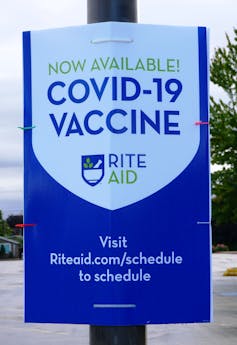RFK Jr. says annual COVID-19 shots no longer advised for healthy children and pregnant women – a public health expert explains the new guidance
- The US Centers for Disease Control and Prevention (CDC) will no longer recommend annual COVID-19 shots for healthy children and pregnant women, citing a lack of evidence to support vaccinating these groups.
- The Food and Drug Administration (FDA) has also announced that it will only approve new versions of the vaccine for adults 65 years of age and older and for people with one or more risk factors for severe COVID-19 outcomes.
- Public health experts have raised concerns about the decision, citing studies showing that COVID-19 vaccination benefits pregnant women and children, and contradicting previous recommendations from organizations such as the American College of Obstetrics and Gynecology and the American Academy of Pediatrics.
- The new policy will likely make it difficult for healthy people to get vaccinated, particularly those under 65, as insurance coverage is widely based on FDA recommendations and the CDC’s vaccine schedule has been altered without input from the Advisory Committee on Immunization Practices.
- Low-risk individuals may still be able to get a COVID-19 shot through “off-label” administration by healthcare providers, but insurance coverage for COVID-19 vaccines is likely to be reduced under the new FDA framework, which could limit access to vaccination for the general public.

On May 27, 2025, Health and Human Services Secretary Robert F. Kennedy Jr. announced that the Centers for Disease Control and Prevention will no longer include the COVID-19 vaccine on the list of immunizations it recommends for healthy children and pregnant women.
The announcement, made in a video posted on the social platform X, comes on the heels of another announcement, made on May 20, in which the Food and Drug Administration revealed that it will approve new versions of the vaccine only for adults 65 years of age and older and for people with one or more risk factors for severe COVID-19 outcomes. The agency will require vaccine manufacturers to conduct clinical trials to demonstrate that the vaccine benefits low-risk groups.
The Conversation U.S. asked Libby Richards, a nursing professor from Purdue University involved in public health promotion, to explain what these announcements mean for the general public.
Why are HHS and FDA diverging from past practice?
Currently, getting a yearly COVID-19 vaccine is recommended for everyone ages 6 months and older, regardless of their health risk.
In the video announcing the plan to remove the vaccine from the CDC’s recommended immunization schedule for healthy children and healthy pregnant women, Kennedy spoke alongside National Institutes of Health Director Jay Bhattacharya and FDA Commissioner Marty Makary. The trio cited a lack of evidence to support vaccinating healthy children. They did not explain the reason for the change to the vaccine schedule for pregnant people, who have previously been considered at high-risk for severe COVID-19.
Similarly, in the FDA announcement made a week prior, Makary and the agency’s head of vaccines, Vinay Prasad, said that public health trends now support limiting vaccines to people at high risk of serious illness instead of a universal COVID-19 vaccination strategy.
Was this a controversial decision or a clear consensus?
Many public health experts and professional health care associations have raised concerns about Kennedy’s latest announcement, saying it contradicts studies showing that COVID-19 vaccination benefits pregnant people and children. The American College of Obstetrics and Gynecology, considered the premier professional organization for that medical specialty, reinforced the importance of COVID-19 vaccination during pregnancy, especially to protect infants after birth. Likewise, the American Academy of Pediatrics pointed to the data on hospitalizations of children with COVID-19 during the 2024-to-2025 respiratory virus season as evidence for the importance of vaccination.
Kennedy’s announcement on children and pregnant women comes roughly a month ahead of a planned meeting of the Advisory Committee on Immunization Practices, a panel of vaccine experts that offers guidance to the CDC on vaccine policy. The meeting was set to review guidance for the 2025-to-2026 COVID-19 vaccines. It’s not typical for the CDC to alter its recommendations without input from the committee.
FDA officials Makary and Prasad also strayed from past established vaccine regulatory processes in announcing the FDA’s new stance on recommendations for healthy people under age 65. Usually, the FDA broadly approves a vaccine based on whether it is safe and effective, and decisions on who should be eligible to receive it are left to the CDC, which bases its decision on the advisory committee’s research-based guidance.
The advisory committee was expected to recommend a risk-based approach for the COVID-19 vaccine, but it was also expected to recommend allowing low-risk people to get annual COVID-19 vaccines if they want to. The CDC’s and FDA’s new policies on the vaccine will likely make it difficult for healthy people to get the vaccine.
What conditions count as risk factors?
The CDC lists several medical conditions and other factors that increase peoples’ risk for severe COVID-19. These conditions include cancer, diabetes, heart disease, obesity, chronic kidney disease and some lung conditions like COPD and asthma. Pregnancy is also on the list.
The article authored by Makary and Prasad describing the FDA’s new stance on the vaccine also contain a lengthy list of risk factors and notes that about 100 million to 200 million people will fall into this category and will thus be eligible to get the vaccine. Pregnancy is included. Reversing the recommendation for vaccinating healthy pregnant women thus contradicts the new framework described by the FDA.
Studies have documented that COVID-19 vaccines are safe during pregnancy and may reduce the risk of stillbirth. A study published in May 2025 using data from 26,783 pregnancies found a link between COVID-19 infection before and during pregnancy and an increased risk for spontaneous abortions.
Importantly, a 2024 analysis of 120 studies including a total of 168,444 pregnant women with COVID-19 infections did not find enough evidence to suggest the infections are a direct cause of early pregnancy loss. Nonetheless, the authors did state that COVID-19 vaccination remains a crucial preventive measure for pregnant women to reduce the overall risk of serious complications in pregnancy due to infection.
Immune changes during pregnancy increase the risk of severe illness from respiratory viruses. Vaccination during pregnancy also provides protection to the fetus that lasts into the first few months of life and is associated with a lower risk of COVID-19 related hospitalization among infants.

Rick Obst, CC BY-SA
The changes to the CDC’s and the FDA’s plan for COVID-19 vaccines also leave out an important group – caregivers and household members of people at high risk of severe illness from infection. This omission leaves high-risk people more vulnerable to exposure to COVID-19 from healthy people they regularly interact with. Multiple countries with risk-based vaccination policies do include this group.
What about vaccines for children?
High-risk children age 6 months and older who have conditions that increase the risk of severe COVID-19 are still eligible for the vaccine. Existing vaccines already on the market will remain available, but it is unclear how long they will stay authorized and how the change in vaccine policy will affect childhood vaccination overall.
To date, millions of children have safely received the COVID-19 vaccine. Data on whether children benefit from annual COVD-19 vaccines is less clear. Parents and clinicians make vaccination decisions by weighing potential risks with potential benefits.
Will low-risk people be able to get a COVID-19 shot?
Not automatically. Kennedy’s announcement does not broadly address healthy adults, but under the new FDA framework, healthy adults who wish to receive the fall COVID-19 vaccine will likely face obstacles. Health care providers can administer vaccines “off-label”, but insurance coverage is widely based on FDA recommendations. The new, narrower FDA approval will likely reduce both access to COVID-19 vaccines for the general public and insurance coverage for COVID-19 vaccines.
Under the Affordable Care Act, Medicare, Medicaid and private insurance providers are required to fully cover the cost of any vaccine endorsed by the CDC. Kennedy’s announcement will likely limit insurance coverage for COVID-19 vaccination.
Overall, the move to focus on individual risks and benefits may overlook broader public health benefits. Communities with higher vaccination rates have fewer opportunities to spread the virus.
This is an updated version of an article originally published on May 22, 2025.
![]()
Libby Richards has received funding from the American Nurses Foundation, the National Institutes of Health, and the Indiana Clinical and Translational Sciences Institute.
